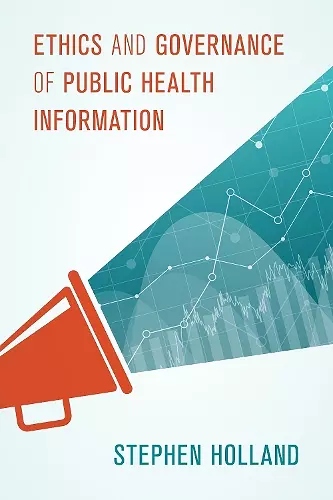Ethics and Governance of Public Health Information
Format:Hardback
Publisher:Bloomsbury Publishing PLC
Published:14th Oct '19
Currently unavailable, and unfortunately no date known when it will be back

The ethics and governance of health information is a major contemporary problem. The central dilemma is between the social utility gained by exploiting health data for public health purposes, and privacy concerns about collecting and using personal information. There is a discernible tendency in our digital age to prioritise privacy protection over social utility, which results in increasingly restrictive regulation of data, including health data. This book defends public health from this distinctive threat. The book starts with a comprehensive taxonomy of public health information – including a novel take on the notoriously vexed ‘research-practice’ distinction – and a discussion of the best governance arrangements for all public health information. Privacy is clearly central to this, so the concept of privacy is analysed to clarify the sort of privacy concerns relevant to public health information. This reveals that risks and harms associated with identifiable data are overstated – for example, when all public health data are assumed to be equally dangerous. Conversely, resources to manage privacy concerns about public health information are systematically understated. For one thing, public health should continue its traditional reliance on anonymization to protect individual privacy, despite increasingly sophisticated re-identification techniques. Also, the requirement to gain consent from individuals to use their information is offset by a duty to provide personal data for the sake of public health. In the same vein, the book ends with a discussion of trust, arguing that there are underemployed ways of increasing public trust in the institutions responsible for managing public health data.
In this timely and well-documented book, Holland (Univ. of York, UK) provides careful, nuanced analyses of the key concepts and main arguments for and against the need for more stringent legislation with respect to the vast quantities of health-related information gathered from individuals today, amounting to an "ocean of datafication." In seven chapters addressing such topics as harm, privacy, anonymity, identifiable data, and consent, Holland argues convincingly that in most cases potential harms are seriously overstated, while the resources available to protect sensitive data are understated. Such debates crucially involve the appropriate use of Mill’s harm principle, according to which it is justifiable to infringe on personal liberty if the harm to society of not doing so will be significant. Many authors claim that more control is needed to protect the privacy of individuals whose data is collected through research. Yet Holland advances the view that progress in disease control depends on exploitation and analysis of such big data. Too much legislation risks reducing scientists' ability to conduct valuable public research and find solutions to intractable problems. Holland has authored highly regarded medical ethics texts, for example Bioethics (2nd ed. CH, Jun'17, 54-4750), and guides research governance within the UK public health establishment. Summing Up: Recommended. Upper-division undergraduates through faculty and professionals. * Choice Reviews *
This is a fascinating book on a timely topic. Holland provides a deft philosophical guide to a wide range of complex issues in the collection, storage and use of public health data. His overarching argument, that concerns about informational privacy have gone too far, is well-developed; researchers, regulators and ethicists should all reflect on it. -- Stephen John, Hatton Lecturer in the Philosophy of Public Health, University of Oxford
ISBN: 9781786600554
Dimensions: 228mm x 160mm x 18mm
Weight: 440g
170 pages